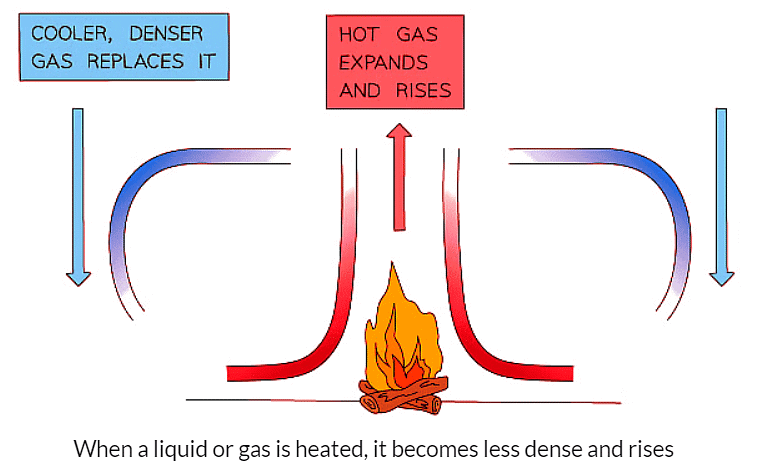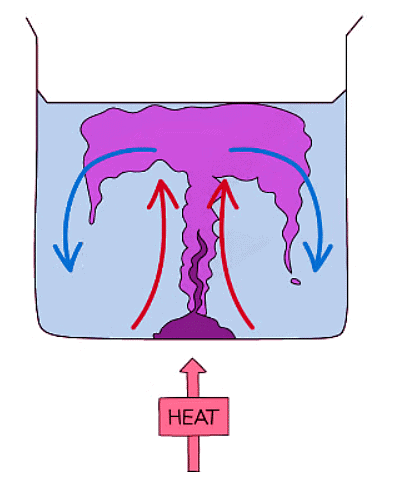Year 11 Exam > Year 11 Notes > Physics for GCSE/IGCSE > Convection
Convection | Physics for GCSE/IGCSE - Year 11 PDF Download
Introduction
- Heat primarily propagates through liquids and gases via convection.
- Convection exclusively takes place within fluids.
- Solids do not facilitate convection.
Density & Convection
Descriptions of convection currents always involve changes in temperature leading to changes in density.
- Both temperature decreases and increases can initiate convection currents.
- When a liquid or gas is heated, the molecules repel each other, causing the substance to expand.
- This expansion results in the heated liquid or gas being less dense than its surroundings.
- The less dense, heated substance rises, while the cooler surrounding substance moves in to fill the vacated space.
- Eventually, as the hot substance cools, it contracts and descends back down.
- The resultant movement constitutes a convection current.

- When a liquid or gas undergoes cooling, the molecules draw closer together, causing the substance to contract.
- This contraction leads to the cold liquid or gas being denser than its surroundings.
- Consequently, the denser, colder substance descends, allowing warmer liquid or gas to occupy the vacated space.
- The warmer substance, in turn, undergoes cooling, contracts, and descends.
- This motion constitutes a convection current.
Question for ConvectionTry yourself: What initiates convection currents in liquids and gases?View Solution
Demonstrating Convection Currents
- A straightforward illustration of convection in liquids entails taking a beaker of water and introducing several crystals of potassium permanganate to one side, as depicted in the diagram.
- As heat is applied to that side, causing the water to warm up, the potassium permanganate will dissolve in the heated water and ascend along with it, thus demonstrating the convection current.
 Diagram showing an experiment with potassium permanganate to demonstrate convection
Diagram showing an experiment with potassium permanganate to demonstrate convection
The document Convection | Physics for GCSE/IGCSE - Year 11 is a part of the Year 11 Course Physics for GCSE/IGCSE.
All you need of Year 11 at this link: Year 11
|
127 videos|148 docs|35 tests
|
FAQs on Convection - Physics for GCSE/IGCSE - Year 11
| 1. What is convection and how does it relate to density? |  |
Ans. Convection is the transfer of heat through the movement of fluids, such as liquids or gases. It is related to density because as a fluid is heated, it becomes less dense and rises, while cooler, denser fluid sinks.
| 2. How are convection currents demonstrated in the context of density? |  |
Ans. Convection currents can be demonstrated by heating a fluid, causing it to expand and rise, then cool and sink. This creates a circular motion of fluid known as a convection current.
| 3. What role does density play in the formation of convection currents? |  |
Ans. Density plays a crucial role in the formation of convection currents as differences in density within a fluid result in the movement of fluid due to the buoyancy forces acting on the fluid.
| 4. How does the concept of density affect the speed of convection currents? |  |
Ans. The speed of convection currents is influenced by the density of the fluid, with less dense fluid rising faster and more dense fluid sinking slower. This difference in speed contributes to the continuous circulation of the fluid.
| 5. Can you explain how convection currents impact weather patterns on Earth? |  |
Ans. Convection currents play a significant role in shaping weather patterns on Earth as warm air rises at the equator, cools down, sinks at the poles, and creates global wind patterns, ultimately influencing the distribution of heat and moisture across the planet.

|
Explore Courses for Year 11 exam
|

|
Signup for Free!
Signup to see your scores go up within 7 days! Learn & Practice with 1000+ FREE Notes, Videos & Tests.
Related Searches
















